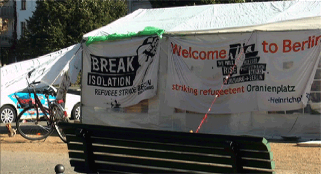- About
- Topics
- Picks
- Audio
- Story
- In-Depth
- Opinion
- News
- Donate
- Signup for our newsletterOur Editors' Best Picks.Send
Read, Debate: Engage.
| November 01, 2012 | |
|---|---|
| tags: | #Amina, #asylum seeker, #Berlin, #Flüchtlinge, #Flüchtlingscamp, #Germany, #Green party, #Grüne, #Kreuzberg, #mandatory residence, #Mecklenburg-Vorpommern, #NPD, #Oranienplatz, #protest, #residenzpflicht, #Sachsen, #Somali, #Somalia, #refugees |
| located: | Germany, Somalia |
| by: | Sara Jabril |
Knowing hardly anything about Germany, and no German whatsoever, Amina came here and was put in an accommodation center for asylum seekers in the Eastern federal state of Mecklenburg-Vorpommern, which is a so-called "new federal state" (German: neues Bundesland) that was formerly part of the GDR. Sachsen and Mecklenburg-Vorpommern are the only two German states, where the right-wing extremist National Democratic Party of Germany (NPD) managed to secure enough votes to get elected into the Landtag, the state parliament.
Amina feels uneasy at the accommodation center in Germany's East. She desperately wants to start a German course to avoid the daily frustration that occurs when she doesn't understand things or when people get annoyed with her not understanding. Yet she says that it's too difficult without any help. "I have to take the bus from where we live to the center of town and even this is too difficult without any language skills AND a little baby", she told me. The conversation I had with Amina took place at my aunt's place in Berlin, while Amina was here for a brief visit with her son.
In Germany's multicultural capital, she met numerous Somalis, who came to Germany many years ago, who know the German system well and speak the language perfectly. It would be considerably easier for Amina to settle in and integrate with the help of some of her fellow country men and women. The so-called "Residenzpflicht" or mandatory residence, however, does not allow Amina to move to Berlin, so she remains stuck all by herself in Mecklenburg-Vorpommern.
Residenzpflicht
In a nutshell, this is how it works. Asylum seekers, who come to Germany, are placed under the jurisdiction of a local foreigners office, and therefore a specific city or federal state depending on where the office is located. The German Refugee Processing Law (German: Asylverfahrensgesetz) states that it is necessary for the asylum seekers to reside in the district or city of the foreigners office that is responsible for them. Anyone defying this law will face fines or even imprisonment.
Germany is the only country within the European Union that dictates this kind of mandatory residence. For several years, human rights activists as well as political parties such as the German Green party have tried to abolish the Residenzpflicht - unsuccessfully.
In recent weeks, refugees and activists from all over Germany have started another protest against this German practice. A plan to start a hunger strike has been announced, and the tent protest camp at Berlin's Oranienplatz in Kreuzberg is another stark reminder that something needs to change. Although it is still unclear for how long the camp will be permitted to remain on Oranien Square, the protesting refugees have vowed to stay until their demands are met by the German government. Apart from abolishing the Residenzpflicht, they call for an improvement of living conditions and treatment of refugees in Germany.
*the name has been changed.
By copying the embed code below, you agree to adhere to our republishing guidelines.

